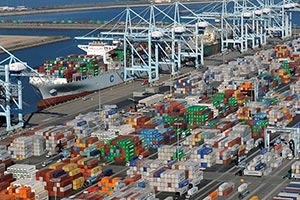US Import Prices Post First Drop in Six Months

U.S. import prices fell for the first time in six months in August on declining petroleum and food costs, pointing to a tame inflation environment that could encourage the Federal Reserve to keep interest rates steady.
The Labor Department said on Sept. 14 that import prices decreased 0.2% in August after an unrevised 0.1% gain in July. Last month's drop was the first since February.
Economists polled by Reuters had forecast import prices slipping 0.1% in August. In the 12 months through August, import prices fell 2.2%, the smallest decrease since October 2014, after declining 3.7% in July.
Import prices have been constrained by a strong dollar and cheap oil. That, together with sluggish wage growth have left inflation persistently running below the Fed's 2% target.
August's weak inflation reading added to a slowdown in job growth and soft manufacturing and services sectors surveys in reducing the likelihood of an interest rate hike at the Fed's Sept. 20-21 policy meeting.
Fed Governor Lael Brainard said on Sept. 12 that she wanted to see stronger consumer spending data and signs of rising inflation before raising interest rates.
The U.S. central bank lifted its benchmark overnight interest rate at the end of last year for the first time in nearly a decade but has held it steady since then amid concerns over persistently low inflation.
U.S. financial markets were little moved by the data.
The nation continued to import deflation from China, with the cost of goods imported from that country falling 0.2%. Prices for Chinese imports have not recorded a monthly increase since December 2014.
August's decrease was led by a 1.0% decline in the price of imported communications equipment. There were also declines in the cost of imported goods from Canada, the European Union and Mexico. The cost of imports from Japan, however, rose 0.3%, the largest gain since August 2011.
Imported petroleum prices declined 2.8% last month after decreasing 3.6% in July. Import prices excluding petroleum were unchanged after climbing 0.5% in July.
Prices for imported capital goods were unchanged, while the cost of imported automobiles fell 0.2%. Imported consumer goods prices excluding automobiles slipped 0.1%, and the cost of imported food decreased 0.5% last month.
The report also showed export prices fell 0.8% in August. That was the biggest drop since January and followed a 0.2% increase the prior month. Export prices were down 2.4% from a year ago.


